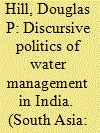| Srl | Item |
| 1 |
ID:
157093


|
|
|
|
|
| Summary/Abstract |
Orthodox approaches to managing Himalayan rivers endorse a singular focus on water as a resource to be harnessed for national security and economic progress, as epitomised by the proposed acceleration of large-scale hydropower construction in the Brahmaputra basin. In reality, existing large-scale hydropower development in the region frequently involves corruption, environmental destruction and forced displacement. This paper argues for an alternative approach to understanding the role of water in India's extractive zones within and beyond the boundaries of the nation, utilising the notions of ‘embeddedness’, ‘hydro-informality’ and ‘rescaling politics’. It is argued that reframing the river in this way can open up space for more just and sustainable practices.
|
|
|
|
|
|
|
|
|
|
|
|
|
|
|
|
| 2 |
ID:
115234


|
|
|
|
|
| Publication |
2012.
|
| Summary/Abstract |
The corporatisation of Port Klang from the mid-1980s onwards was a significant moment in the history of Malaysia's political economy and generated considerable momentum for the changes that were to occur in this late industrialising nation under the leadership of the Barisan Nasional government. In particular, the restructuring of how labour was organised in Malaysia's most significant port became frequently cited both within and outside the country as a model for tripartite labour privatisation and the well-managed divestment of state-owned enterprises. However, in the past decade, the organisation of labour in the port has again changed dramatically. Migrant labour from some of the poorest parts of Asia now makes up the majority of semi-skilled and unskilled workers. Based on fieldwork carried out during 2009 with workers from Bangladesh and Nepal who are employed in Port Klang, this paper suggested that a regulatory vacuum now exists in the port, which means foreign workers are often treated badly and have few avenues for dissent. An analysis of the changing labour regime in Port Klang over time can assist in understanding the contemporary political economy of Malaysia as well as illuminate debates about the spaces of migrant labour more broadly.
|
|
|
|
|
|
|
|
|
|
|
|
|
|
|
|
| 3 |
ID:
121114


|
|
|
|
|
| Publication |
2013.
|
| Summary/Abstract |
The already divisive politics of South Asia's trans-boundary water resources are further complicated by the rush to construct large- and medium-scale dams. While highly contested in India today, hydropower construction reflects a nexus of state and capital that discriminates against the poorest and most marginalised citizens. Alternatives to the multiple crises of water within and beyond India must look beyond state-centrism and, instead, promote multi-scalar civil society organisations and networks, which may contribute to a more sustainable and transparent South Asia in the future.
|
|
|
|
|
|
|
|
|
|
|
|
|
|
|
|
| 4 |
ID:
141915


|
|
|
|
|
| Summary/Abstract |
Hydropower development clearly has a significant role to play in the closer integration of different parts of the Himalayas and in facilitating downstream benefits throughout South Asia. However, the neo-liberal approach to infrastructure-led growth frequently overlooks the significant social, economic and political issues associated with this model of development in the region. Furthermore, the ongoing securitisation of water constrains the terms of debate under the guise of a unified national interest and enables large-scale dams to be constructed without due process. To desecuritise water in the Himalayas is to open up this dialogue and in so doing create the conditions for just and sustainable development.
|
|
|
|
|
|
|
|
|
|
|
|
|
|
|
|